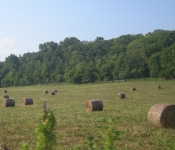How do we make the biofuels and bioproduct industry sustainable? This question is answered in the lastest “quick brief” published by Advanced Biofuels USA. According to the paper, the key is the development of low cost, decentralized biomass to biofuel production systems that can economically increase the travel distance of biomass. It is also important to make biomass available year round. Subsequently the industry could become a seamless system ready to meet market supply and demand and bioenergy producers would no longer have to rely on single crops grown close to home.
 The quick brief was authored by Robert Kozak and in the paper he describes the sustainable system as able to “efficiently convert harvested field crops, slash timber, and agricultural residues at their point of production into biofuel and bioproduct precursors [oils or sugars] with sufficient value so they may be economically transported in excess of 500 miles.”
The quick brief was authored by Robert Kozak and in the paper he describes the sustainable system as able to “efficiently convert harvested field crops, slash timber, and agricultural residues at their point of production into biofuel and bioproduct precursors [oils or sugars] with sufficient value so they may be economically transported in excess of 500 miles.”
Upon completion of the journey, the paper continues, the biomass arrives at a large-scale biorefinery designed to produce bioproducts from multiple sources of biomass. In many cases, the biorefinery would be co-located with existing petroleum refineries.
Joanne Ivancic, Executive Director of Advanced Biofuels USA noted, “This paper makes clear the importance of committing to decentralized/centralized research in the 2012 Farm Bill. Turning these innovative ideas into realities will allow agricultural communities to remain viable and will bring badly needed jobs to depressed industrial areas. A commitment to this exciting future makes it clear that the Farm Bill benefits all Americans; not only farmers and farming communities.”

